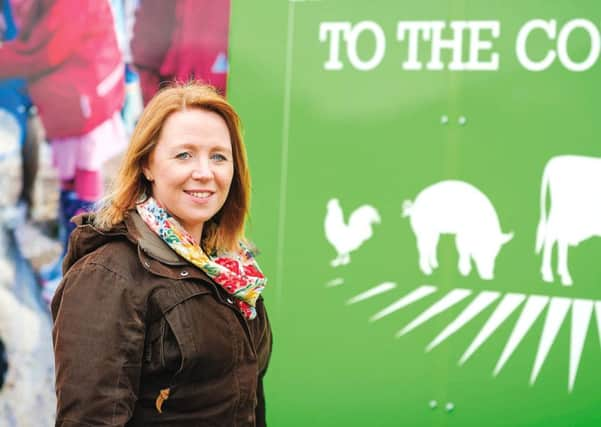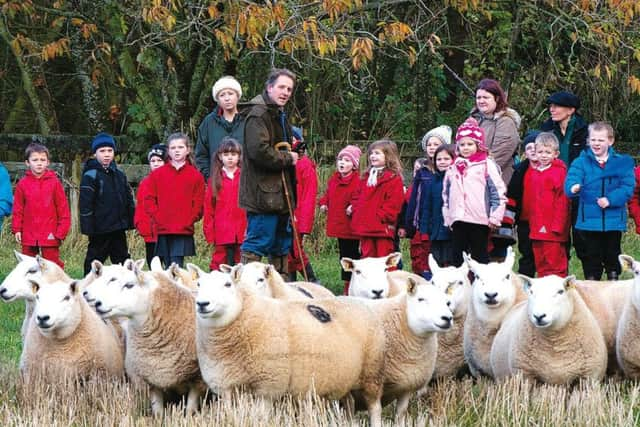Vision Scotland: Lessons in the field


Thanks to the recently launched RHET Corporate Supporter Scheme, even more young people aged between three and 18 are set to benefit from farm visits, classroom talks and activities linked to the Curriculum for Excellence (CFE).
Through the scheme, every £1,000 will allow 100 children to attend a visit to the working countryside or a classroom talk for 300 pupils.
Advertisement
Hide AdAdvertisement
Hide AdThe trust’s manager Katrina Barclay says: “We prioritise getting children out to the working countryside first and foremost. If we can’t get them out to the countryside then we will go and see them. It’s done the length and breadth of Scotland all year long and 45,000 pupils a year have classroom talks.”


RHET, which comprises 11 countryside initiatives, was set up in 1999 as the educational charity of the Royal Highland and Agricultural Society of Scotland (RHASS) and was “born out of a passion of farmers”. The importance of the trust’s work lies in the fact that it is relevant to 90 per cent of the Scottish national curriculum, according to Barclay.
“By that I mean when it comes to health and wellbeing, literacy, science or computing, by coming to a farm, we can bring that learning and that passion to life,” she says.
One example is a maths-based activity where children measure a combine harvester with their feet to work out how long it is and how many times it would need to go up and down a field to harvest it. Another involves children growing their own pizza by growing their own wheat and tomatoes.
They then have the responsibility of nurturing the plants, which fits into the CFE’s health, wellbeing and sustainability approach.
Similarly, the children can learn with animals to calculate the amount of feed that is required on a daily basis.
The programmes are delivered by highly-trained project co-ordinators whose knowledge of the local area and its farmers “brings it all to life”.
They work in rural communities to maintain a network of farmers who host farm visits and voluntarily carry out classroom talks. All RHET services are free of charge.
Advertisement
Hide AdAdvertisement
Hide AdThey work with all age groups and the trust is currently in the very early stages of developing a virtual reality system for pupils, particularly those who have additional support needs.
Barclay says: “We work very closely with the teacher to find out if there is anything we can provide to help any of the pupils prepare for their visit.
“It might be pictures of what they should expect to see or a map. These will help them feel more comfortable and help them engage so using virtual reality will be great to help those groups.”
Such technological innovation is familiar across all aspects of the farming industry.
Barclay, who has been with RHET for more than seven years, says: “Technology is used in farming, for example, around the mapping of fields to know the application rate of the fertiliser.
“It’s all translated over into maps which are then connected to a GPS system, so we can explore computing and farming and you can then link it to profit and loss and to business management. Depending on the age group, you can have a very engaged dialogue and get a good debate going.”
At secondary school level, the focus is mostly about the business of the farms, their financial impact and the technology used and it is also an opportunity to discuss careers with the trust’s team.
As well as developing skills such as numeracy, being exposed to the working countryside has another long-term value.
Advertisement
Hide AdAdvertisement
Hide AdBarclay believes the connection between agriculture and education all comes down to food and our relationship with it.
“There is a fabric that we talk of that links farms throughout the community, from their town or village and all the services from the schools to the local shops that that farm uses.
“So, understanding the person producing your food, who is growing the oats for your cereal or who is looking after the animal that is producing the yoghurt that you have for your lunch, is really important.
“We use the whole range of farms so that people can find out for themselves what is involved and they can make their food choices and decisions based on what they have seen and heard.”
The activities organised by RHET, of which the Princess Royal is patron, allow young people to find out how crops are grown and meat is reared as well as why.
“[RHASS] sees the value we are delivering and going through their history books, education has always been a part of the society and there is a real synergy between us.”
So much so that the society provides funding for the trust to the tune of £200,000 each year. However, despite receiving that amount as well as restricted government funding, a key challenge faced by RHET is access.
Towards the end of the academic year, the trust is inundated with requests from schools for farm visits and is struggling to meet the schools’ expectations.
Advertisement
Hide AdAdvertisement
Hide AdBarclay says: “When we get funding for three years, then we can start actioning those projects that we have got sitting on the shelves. This would allow us to do more visits or more events and open up the engagement, which is why we need to secure more funds.”
The farming industry is often falsely viewed as inaccessible or lacking in terms of a flexible consumer-facing element. However, the positive impact of the trust’s work is wide according to Barclay.
“We evaluate the teachers’ experience and carry out surveys where we ask people to rate their knowledge before and after an event, for example,” she says.
“One of the areas we have been developing from this feedback is our teacher training programme.
“It’s all very well expecting teachers to deliver a very complex and very interesting area such as agriculture, but we can help them.
“We have identified, with the help of Education Scotland and other organisations, where the gaps are, such as case study material or resources that really bring agriculture into the classroom environment.”
Furthermore, 300 groups of young people are engaged with the trust’s education programme for schools at the Royal Highland Show at Ingliston each June.
RHET has its own Discovery Centre during the four-day celebration of Scotland’s top quality livestock and food and drink.
Advertisement
Hide AdAdvertisement
Hide AdThis year the centre will have many hands-on activities, including a cookery sessions, for either schools or members of the public to book.
Barclay says: “The cookery theatre is one of the sensory overloads of the day – that’s where young people can prepare their own dish from start to finish.
“We have Scotch beef, Scotch lamb, specially selected pork and on the Sunday we are having ‘left-over Sunday‘ so we will come up with innovative dishes that they can cook and take away with them. It’s a real life skill but we have every age group taking part in it.”
The trust works with other expert organisations to provide the sessions which also include working with seafood and baked produce.
The Dundee-based James Hutton Institute will lead science-based events about soils, while the British Agricultural & Garden Machinery Association in partnership with Scotland’s Rural College will be hosting machinery-based sessions.
Having the opportunity to ask farmers and food producers questions about all parts of the farming industry and agriculture is an eye-opener, according to Barclay.
She says: “The working countryside is something that we all have a connection to and there is a lot to be said for what’s happening in the countryside at any time – what’s been growing, being reared and why. That face-to-face time is a wonderful opportunity.”
The trust’s success is down to the drive of the people involved in the industry.
Advertisement
Hide AdAdvertisement
Hide Ad“It’s the farmers who give us their time who volunteer and they sign up to take educational visits. We are often asked by farming organisations from across the world how does it work and why is it so successful.
“It looks like we are very unique across the world because of the drive of our farmers. We are very lucky that at a local level we have farmers telling their neighbours that they should get involved with RHET activities.”
This article appears in the SUMMER 2018 edition of Vision Scotland. An online version is available here.